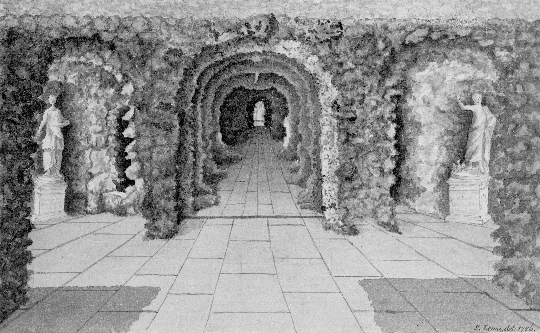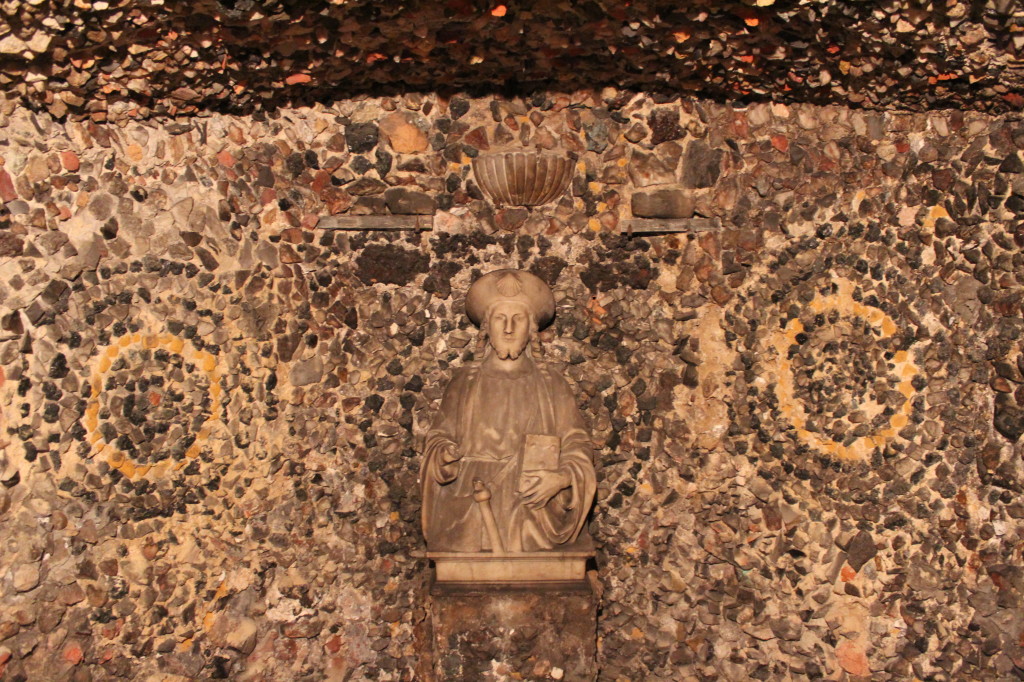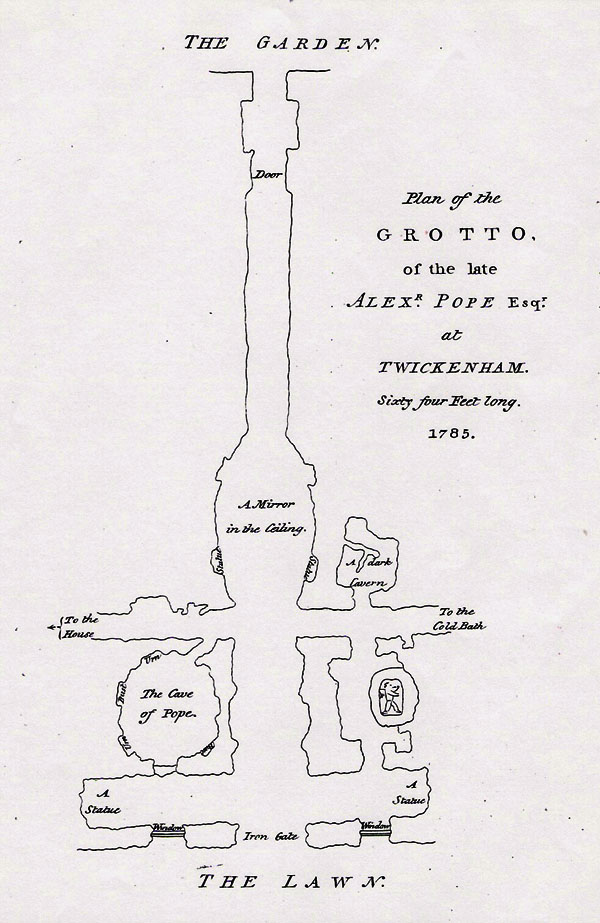【NSPS-276 Hot JAV Porn Movie】
Underground
Our Daily Correspondent

A sketch of Pope’s grotto.
Today marks the day of Alexander Pope’s birth, in 1688. We remember Pope as a poet, essayist, satirist, translator, and one of the most quotable men in English. He’s responsible for, among many other aphoristic gems: “To err is human, to forgive, divine.” “Fools rush in where angels fear to tread.” “What Reason weaves, by Passion is undone.” “Hope springs eternal in the human breast.” “A little learning is a dangerous thing.” And, yes, the phrase “Eternal sunshine of the spotless mind.”
In his time, he was also known for his amazing home, a Palladian villa at Twickenham surrounded by elaborate gardens and grottoes. Pope’s wealthy family was ostracized for its Catholicism, and his numerous health problems—he suffered from Pott’s disease, which stunted his growth to only four foot six—somewhat limited his social life. His home seems to have been a refuge, as well as a definitive indicator of his success.
The house, a Classical mansion surrounded by vast grounds, was grand enough, but it was the Homeric grotto that really got Pope’s heart racing. As he wrote at the time of its construction,
I have put the last hand to my works … happily finishing the subterraneous Way and Grotto: I then found a spring of the clearest water, which falls in a perpetual Rill, that echoes thru’ the Cavern day and night …When you shut the Doors of this Grotto, it becomes on the instant, from a luminous Room, a Camera Obscura, on the walls of which all the objects of the River, Hills, Woods, and Boats, are forming a moving Picture … And when you have a mind to light it up, it affords you a very different Scene: it is finished with Shells interspersed with Pieces of Looking-glass in angular Forms…at which when a Lamp…is hung in the Middle, a thousand pointed Rays glitter and are reflected over the place.
Later, he added, “Were it to have nymphs as well—it would be complete in everything.”

Photo via thelondonphile
After he visited a mine, Pope was inspired to decorate the grotto further with what the Twickenham museum describes as “ores, spars, mundic, stalactites, crystals, Bristol and Cornish diamonds, marbles, alabaster, snakestones and spongestone.” There were also rumors that he stole and cajoled some of these from neighboring sites, possibly defamatory in nature.
Apparently, the grotto was widely considered ridiculous. Lady Mary Wortley Montague mocked it:
Here chose the goddess her belov’d retreat,
Which Phoebus tries in vain to penetrate,
Adorn’d within with shells of small expense,
(Emblems of tinsel Rhyme and triffleing sense)
Perpetual fogs enclose the sacred Cave;
The neighbouring sinks their fragrant odours gave.

A sketch of the grotto by Samuel Lewis, 1785
Said Dr. Johnson, “A grotto is not often the wish or pleasure of an Englishman, who has more frequent need to solicit rather than exclude the sun, but Pope’s excavation was requisite as an entrance to his garden, and, as some men try to be proud of their defects, he extracted an ornament from an inconvenience, and vanity produced a grotto where necessity enforced a passage.”
But then, that’s the risk you run when you spend all your time with noted wits, I suppose. And in fact, grottoes were all the crack—indeed, Pope’s was so terrific that it apparently inspired several others.
The villa was demolished in the early nineteenth century, and nowadays the site is occupied by the modern buildings of the Radnor House School. Somewhat amazingly, the grottoes are still largely intact, if denuded of their mineral decorations, and are opened to the public a couple of times a year. Personally, I can’t imagine anything better—or, I guess, worse—to have under a high schoolthan a vast, forbidden series of caves, underground passages, and totally hidden retreats. Anyway, if I were part of the Pope’s Grotto Preservation Trust, I might have my concerns.
Pope, however, might have approved. As he wrote near the end of his life, “Most men in years, as they are generally discouragers of youth, are like old trees, which, being past bearing themselves, will suffer no young plants to flourish beneath them.”
Search
Categories
Latest Posts
Episode 4: The Wave of the Future
2025-06-26 17:09Forget Tinder: This hot app wants to be your hookup for hooking up
2025-06-26 16:44Oculus cofounder Palmer Luckey out at Facebook
2025-06-26 16:27What's up with the song in the new 'Game of Thrones' trailer?
2025-06-26 15:35Best JBL deal: Save $80 on JBL Xtreme 4 portable speaker
2025-06-26 15:10Popular Posts
Amazon Pet Day: All the best deals
2025-06-26 16:48The Property Brothers still live together, so there's that
2025-06-26 16:09Draper vs. Arnaldi 2025 livestream: Watch Madrid Open for free
2025-06-26 15:15Featured Posts
4GHz CPU Battle: AMD 2nd
2025-06-26 16:58Is 'Buffy the Vampire Slayer' getting a revival?
2025-06-26 16:56The Mismeasure of Media
2025-06-26 14:57Popular Articles
Get Rid of Windows 10 Ads, Office Offers and Other Annoyances
2025-06-26 17:01Why Beyoncé as Nala in 'The Lion King' would be amazing
2025-06-26 16:01Uber update allows riders to edit their pickup location
2025-06-26 15:07Music is the secret weapon of Mario Speedrunners
2025-06-26 15:01Newsletter
Subscribe to our newsletter for the latest updates.
Comments (9522)
Childhood Fun Information Network
Diseases from mosquitos and ticks have tripled in the U.S., CDC finds
2025-06-26 16:46Exquisite Information Network
Why is BioWare building hype for sorely needed 'Mass Effect' fixes?
2025-06-26 16:06Global Information Network
Your college email account may be one of millions for sale on the dark web
2025-06-26 15:41Pursuit Information Network
NASA's Peggy Whitson broke another space record and would she just adopt me already?
2025-06-26 15:32Prosperous Times Information Network
Best Sony deal: Save $100 on WH
2025-06-26 14:48